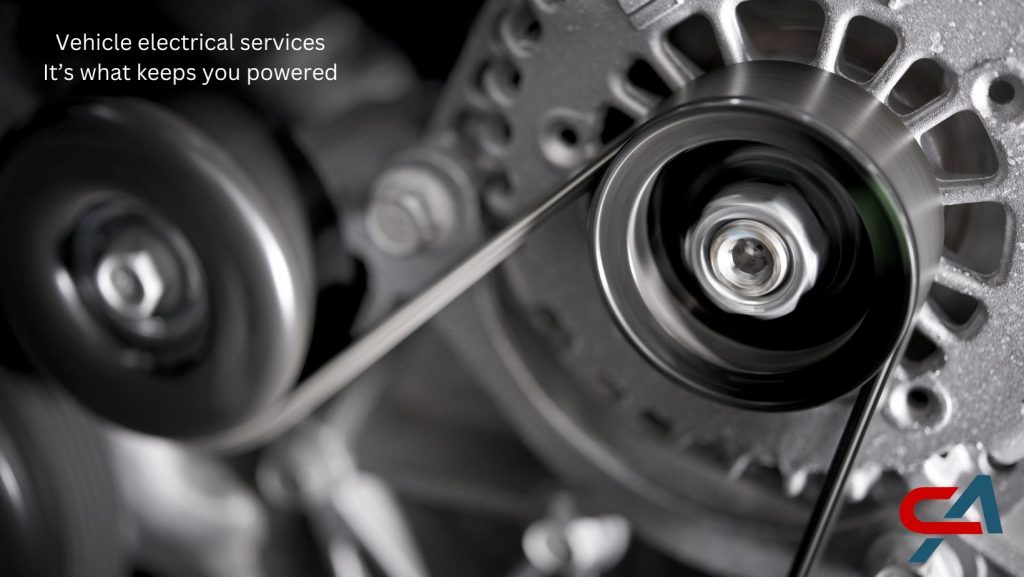Powering Up Precision
In the heart of every modern vehicle lies a complex electrical system, powering everything from lights and entertainment systems to critical components like the starter and alternator. Over time, wear, and electrical issues can compromise the system’s efficiency, affecting the vehicle’s performance and reliability. In this blog, we’ll explore what a vehicle electrical system service entails, why it matters, and how it plays a crucial role in maintaining optimal functionality and safety.
Vehicle Electrical System Service Unveiled: Energizing Performance and Reliability
Vehicle electrical system service is a comprehensive maintenance process focused on inspecting, testing, and repairing or replacing components within the electrical system. This includes the battery, alternator, starter, wiring, and various electronic components, all working in harmony to ensure the vehicle’s electrical functions operate optimally.
Components Addressed in Vehicle Electrical System Service: Navigating the Circuitry of Functionality
Battery
The battery is the electrical powerhouse of the vehicle, providing the initial burst of energy to start the engine. During service, the battery is tested for charge capacity, voltage, and overall health.
Alternator
The alternator is responsible for generating electrical power to recharge the battery and power electrical components while the vehicle is running. It is inspected for proper charging output.
Starter
The starter motor is essential for initiating the engine’s cranking process. It is inspected for proper engagement and efficient operation.
Wiring and Connectors
The intricate network of wiring and connectors throughout the vehicle is examined for signs of wear, corrosion, or damage that could impede electrical flow.
Spark Plugs and Ignition System
Spark plugs and the ignition system are critical for the combustion process in the engine. Service may involve inspecting and replacing spark plugs and ensuring the ignition system functions optimally.
Lights and Electrical Accessories
Lights, electronic accessories, and control systems are checked for proper operation, addressing issues such as flickering lights or malfunctioning electronic components.
The Need for Vehicle Electrical System Service: Ensuring Uninterrupted Power
Battery Wear
Over time, batteries can lose their charge capacity, leading to difficulties starting the engine or providing power to electrical components.
Alternator Issues
Malfunctions in the alternator can result in insufficient charging, leading to a drained battery and overall electrical system failure.
Starter Motor Problems
A failing starter motor may result in slow or erratic engine cranking, leading to difficulty starting the vehicle.
Wiring and Connector Concerns
Damaged or corroded wiring and connectors can impede electrical flow, causing malfunctions in various systems.
Ignition System Failures
Issues with spark plugs or the ignition system can lead to misfires, poor engine performance, and reduced fuel efficiency.
Electronic Component Malfunctions
Malfunctions in lights, electronic accessories, or control systems can compromise safety and convenience.
Signs Your Vehicle Needs Electrical System Service: Decoding the Warning Signals
Dimming Lights
Dimming headlights or interior lights may indicate issues with the battery, alternator, or electrical connections.
Slow Engine Cranking
If the engine cranks slowly or struggles to start, it could signal a problem with the battery or starter motor.
Dashboard Warning Lights
Illumination of warning lights, especially the battery or charging system indicator, suggests potential issues with the electrical system.
Electrical Accessory Malfunctions
Malfunctions in electronic accessories, such as power windows, mirrors, or infotainment systems, may point to electrical system issues.
Burning Smells
A burning smell, especially when using electronic accessories, could indicate overheating or electrical component failure.
Frequent Jump Starts
The need for frequent jump starts suggests a weak or failing battery.
Service Intervals: Timing the Maintenance of Electrical Harmony
The frequency of electrical system service can vary based on factors such as driving conditions, vehicle age, and manufacturer recommendations. It is advisable to consult your vehicle’s owner’s manual for specific guidelines on service intervals.
DIY vs. Professional Electrical System Service: Making the Right Connection
While basic inspections and maintenance tasks can be performed by vehicle owners, a comprehensive electrical system service is best left to professional technicians. Trained experts can conduct thorough diagnostics, identify nuanced issues, and ensure that all components are properly inspected, repaired, or replaced.
Benefits of Electrical System Service: Powering Up Performance and Safety
Reliable Engine Starts
Regular service ensures that the battery, starter, and alternator work in harmony, providing reliable engine starts.
Optimal Charging
A well-maintained alternator ensures optimal charging, preventing battery drain and electrical system malfunctions.
Extended Battery Life
Testing and maintaining the battery contribute to its longevity, reducing the frequency of replacements.
Improved Fuel Efficiency
A properly functioning electrical system contributes to improved fuel efficiency by ensuring optimal engine performance.
Enhanced Safety
Reliable lighting and electronic systems contribute to overall safety, reducing the risk of accidents due to malfunctioning lights or accessories.
Preventive Maintenance
Regular electrical system service is a form of preventive maintenance, addressing issues before they escalate and ensuring uninterrupted vehicle operation.
Manufacturer Recommendations: Adhering to Service Intervals for Optimal Performance
To ensure the ongoing performance and reliability of your vehicle’s electrical system, it is crucial to adhere to the service intervals recommended by the manufacturer. Following these guidelines helps maintain optimal electrical harmony, preventing unexpected breakdowns and ensuring a smooth driving experience.
The vehicle’s electrical system is the unseen force that powers various components essential for performance, safety, and convenience. Vehicle electrical system service is a proactive approach to addressing potential issues, ensuring reliable engine starts, and maintaining optimal electrical harmony. By understanding the components addressed in electrical system service, recognizing signs that your vehicle may need it, and adhering to manufacturer recommendations for service intervals, you can power up your vehicle’s performance, reliability, and safety.

